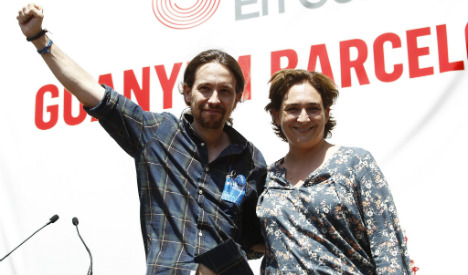Balance of power lies with undecided voters

As Spain heads towards Sunday’s municipal and regional elections, the country's political parties are scrambling to woo wavering voters, who look set to decide the outcome in one of the closest elections in memory.
Mere days before Spaniards take to the polls in local and regional elections it is still unclear which parties will triumph, the result lying in the hands of the 30 - 45 percent of as yet undecided voters.
Voters have more choice than ever before, due to the rise of two political parties, Podemos and Ciudadanos, who have brought an end to Spain's traditional two-party system.
They are nipping at the heels of Spain’s two traditional political parties, the Popular Party, currently in power, and the opposition Socialists.
All municipal elections will be held on Sunday May 24th as well as parliamentary elections in 13 of Spain’s 17 semi-autonomous regions.
Andalusia, Catalonia, Galicia and the Basque Country have different regional cycles; Andalusia’s regional election was held on March 22nd 2015, while Catalonia’s will be held in September 2015 and Galicia’s and the Basque Country’s scheduled for 2016.
In the 13 regions that are holding elections this week, undecided voters make up around 30 to 45 percent according to Spanish daily El País.
Comparing a survey from Spain’s national statistics agency published in 2011 with one published in 2015 sheds light on just how much more undecided Spaniards have become.
To the question "If an election was held tomorrow, who would you vote for?" 16 percent of people in Madrid were still unsure in 2011 compared to 31.7 percent in 2015.
The pattern continues across other regions. In La Rioja, 19 percent of people said they would be unsure of who to vote for in 2011 compared to 41 percent today, while in Barcelona, 20.9 percent were undecided in 2011 compared to 47 percent in 2015.
Spain’s two biggest parties are calling on voters to elect them to guarantee that no deals will have to be struck with the country’s smaller parties; the Popular Party with Ciudadanos and the PSOE with the smaller parties on the left.

Photo: AFP
In some areas wild cards are posing a threat to the establishment. In Barcelona, for instance, Ada Colau (pictured above with Podemos leader, Pablo Iglesias), an activist who has gained popularity for her involvement in the anti-eviction platform, is poised to upend CiU incumbent mayor Javier Trias.
In expat heavy coastal areas, the key to the town halls could be in getting foreign residents out to vote.
In Mojacar on the Costa Almeria for example, where 52 per cent of the population are foreigners, a new party, SOMOS Mojacar is fielding 13 out of 18 expats on its party list.
This election campaign has seen its fair share of calamities from across the political spectrum, with everything from naked candidates, and singing incumbents to defecting party founders threatening to turn off voters.
Comments
See Also
Mere days before Spaniards take to the polls in local and regional elections it is still unclear which parties will triumph, the result lying in the hands of the 30 - 45 percent of as yet undecided voters.
Voters have more choice than ever before, due to the rise of two political parties, Podemos and Ciudadanos, who have brought an end to Spain's traditional two-party system.
They are nipping at the heels of Spain’s two traditional political parties, the Popular Party, currently in power, and the opposition Socialists.
All municipal elections will be held on Sunday May 24th as well as parliamentary elections in 13 of Spain’s 17 semi-autonomous regions.
Andalusia, Catalonia, Galicia and the Basque Country have different regional cycles; Andalusia’s regional election was held on March 22nd 2015, while Catalonia’s will be held in September 2015 and Galicia’s and the Basque Country’s scheduled for 2016.
In the 13 regions that are holding elections this week, undecided voters make up around 30 to 45 percent according to Spanish daily El País.
Comparing a survey from Spain’s national statistics agency published in 2011 with one published in 2015 sheds light on just how much more undecided Spaniards have become.
To the question "If an election was held tomorrow, who would you vote for?" 16 percent of people in Madrid were still unsure in 2011 compared to 31.7 percent in 2015.
The pattern continues across other regions. In La Rioja, 19 percent of people said they would be unsure of who to vote for in 2011 compared to 41 percent today, while in Barcelona, 20.9 percent were undecided in 2011 compared to 47 percent in 2015.
Spain’s two biggest parties are calling on voters to elect them to guarantee that no deals will have to be struck with the country’s smaller parties; the Popular Party with Ciudadanos and the PSOE with the smaller parties on the left.

Photo: AFP
In some areas wild cards are posing a threat to the establishment. In Barcelona, for instance, Ada Colau (pictured above with Podemos leader, Pablo Iglesias), an activist who has gained popularity for her involvement in the anti-eviction platform, is poised to upend CiU incumbent mayor Javier Trias.
In expat heavy coastal areas, the key to the town halls could be in getting foreign residents out to vote.
In Mojacar on the Costa Almeria for example, where 52 per cent of the population are foreigners, a new party, SOMOS Mojacar is fielding 13 out of 18 expats on its party list.
This election campaign has seen its fair share of calamities from across the political spectrum, with everything from naked candidates, and singing incumbents to defecting party founders threatening to turn off voters.
Join the conversation in our comments section below. Share your own views and experience and if you have a question or suggestion for our journalists then email us at [email protected].
Please keep comments civil, constructive and on topic – and make sure to read our terms of use before getting involved.
Please log in here to leave a comment.